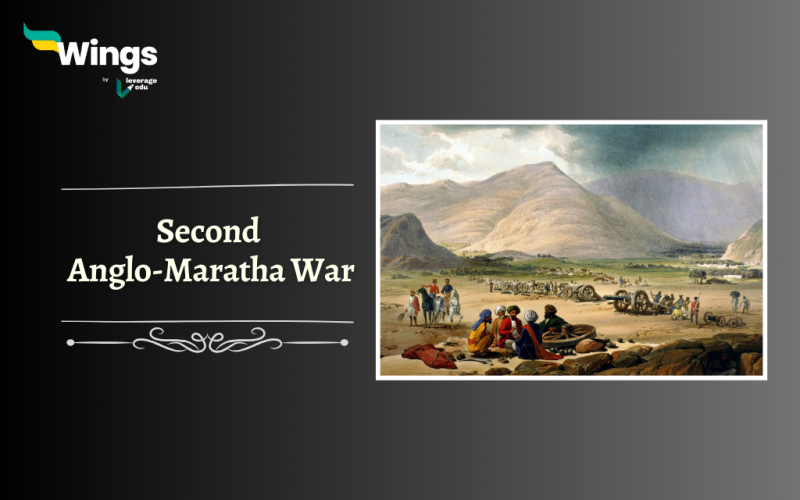The beginning of the second Anglo-Maratha war was seen in 1803 and ended in 1805. It is a series of wars that were fought between the East India Company and the Maratha Empire. The ‘Treaty of Salbai’ was signed at the end of the first Anglo-Maratha War. Unlike the first Anglo-Maratha war which ended with the victory of the Marathas, this war ended with the victory of the British East India Company.
Table of Contents [show]

Course of Second Anglo-Maratha War
After the death of the Peshwa Madhav Rao II, the son of Raghunath Rao became the heir to the throne of the Peshwa. By his time Maratha was a significant empire that was untouched by the
Britishers after capturing the Mysore of Tipu Sultan.
- Moreover, the Maratha empire was ruled by five families- Peshwas from Pune, the Gaekwads from Baroda, the Holkars from Indore, the Scindias from Gwalior, and the Bhonsles from Nagpur.
- However, their internal differences the Holkar chief Yashwantrao Holkar fought a battle against Baji Rao II, Peshwa of Pune, in 1802, where the latter lost the fight.
- He then went to the Britishers to seek their help and signed the ‘Treaty of Bassain (Vasai)’ and agreed to the presence of British troops in their territories.
- Moreover, the other two families Bhosale and Scindias rejected this treaty.
All these incidents led to the second Anglo-Maratha war in 1803, on the lands of central or Deccan parts of India.
Also Read – The Treaty of Purandar Between Maratha and British
Outcome of the Second Anglo-Maratha War
- The ‘Treaty of Bassaein’ helped establish the right foot of Britishers on the Indian land. With this, in Pune, paramount British established.
- This made the Maratha confederacy dependent on the Britishers for strength and number and vice versa.
- Any issue that was raised between the Peshwa and the Marathas was solved or intervened by the Britishers.
- The Peshwa had to surrender. He gave up all his powers to the Nizam which is why Hyderabad was indirectly in the control of the British East India Company.
This was all about the second Anglo-Maratha war. If you want to read more articles like this, you can get Short notes on the Modern History of India here. Also, you can visit our general knowledge page on Indian History!
 One app for all your study abroad needs
One app for all your study abroad needs















 45,000+ students trusted us with their dreams. Take the first step today!
45,000+ students trusted us with their dreams. Take the first step today!
